Guangdong nuclear power plant incident: Making a mountain out of a molehill?
Following news that the French co-owner of Taishan Nuclear Power Plant in Guangdong had written to the US Department of Energy regarding an "imminent radiological threat", and disclaimers by state-owned majority owner China General Nuclear Power Group (CGN) that the assertions are false, Chinese social media has been in an uproar and accused Western media of stoking fires. While admitting that "about five" of the uranium fuel rods inside the power plant have been damaged, Chinese authorities maintained that there has been no radiation leak. Zaobao's China Desk puts together the ins and outs of the story.
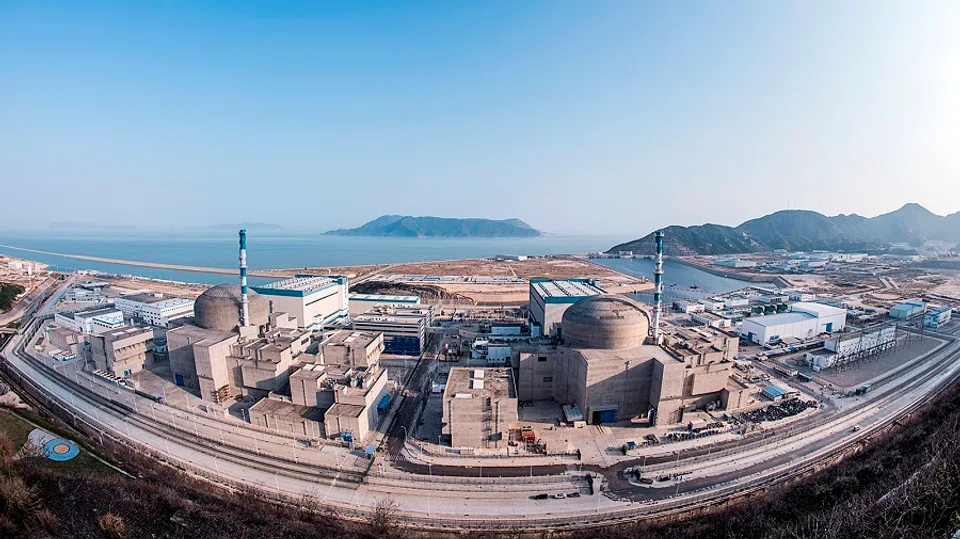
A possible radiation leak at the Taishan Nuclear Power Plant in Guangdong has dominated the Chinese media news cycle in the last few days. Taishan has refuted the allegations, saying that the environmental indicators at the plant and its surrounding areas are "normal". This statement has provided some measure of calm, especially among residents of nearby Hong Kong and Macau.
On 13 June, quoting US officials and documents it has seen, CNN reported that the US government had spent the past week assessing a report of a leak at the Taishan Nuclear Power Plant after Framatome, a French company that co-owns and helps operate the plant warned of an "imminent radiological threat".
CNN had obtained the letter that Framatome, a subsidiary of French energy giant EDF, submitted to the US Department of Energy. In the letter, Framatome claimed that the Chinese safety authority was raising the acceptable limits for radiation detection around the Taishan Nuclear Power Plant to avoid having to shut it down.
The Taishan Nuclear Power Plant is owned by the Taishan Nuclear Power Joint Venture Co. Ltd. The China General Nuclear Power Group (CGN) owns 51% of the joint venture, while the EDF owns 30% of it. The remaining 19% belongs to Guangdong Energy Group. The Taishan Nuclear Power Plant is the product of the first nuclear agreement signed between China and a foreign investor.
However, one of the sources was quoted by CNN as saying that notwithstanding Framatome's warning, the US government believes that the facility is not yet at a "crisis level". Sources also said that the US government has discussed the situation with the French government and experts at the US Department of Energy. The article added that the US has also been in contact with the Chinese government, although it is unclear to what extent.
The article went on to say that while the US government declined to elaborate on the outcome of the assessment, officials at the US National Security Council, State Department and the Department of Energy indicated that if the situation were to pose a threat to the Chinese public, they would make the contents known in accordance with current treaties on nuclear accidents.
Chinese netizens swiftly took to the internet to mock the US for "worrying too much on behalf of China". Some pointed out that the CNN report was "creating chaos for the world" and criticised Western media for "spreading disinformation" and "making a mountain out of a molehill".
Chinese social media riled up
This report immediately drew strong reactions on Chinese social media. The main point of contention was that a foreign company had unilaterally asked the US government for assistance before its partner, a Chinese state-owned company, acknowledged the problem.

Chinese netizens swiftly took to the internet to mock the US for "worrying too much on behalf of China". Some pointed out that the CNN report was "creating chaos for the world" and criticised Western media for "spreading disinformation" and "making a mountain out of a molehill".
Following the escalation of the incident, the Taishan Nuclear Power Joint Venture Co. Ltd published a statement on its website on 13 June stating, "Since it began commercial operations, the Taishan Nuclear Power Plant has strictly controlled the operation of the reactors in accordance with operating license documents and technical procedures. All operating indicators of the two reactors have met the requirements of nuclear safety regulations and power plant technical specifications."
The statement also maintained that the environmental readings for both the plant and its surrounding area were "normal" after regular monitoring.
This brief statement also mentioned that the power plant uses two European Pressurised Reactor (EPR) reactors. Unit 1 entered into commercial operation on 13 December 2018, and Unit 2 on 7 September 2019. "Unit 1 of Taishan Nuclear Power Plant is currently operating at full power. Taishan Nuclear Power Plant Unit 2 has been overhauled as planned and was successfully connected to the grid on June 10, 2021."
It added that this was the first time Unit 2 was overhauled since it was put into commercial operation and that "all safety, quality and project period indicators of the overhaul have fulfilled their set goals".
Employees and their family eating mangoes at the site
On 14 June, the Taishan Nuclear Power Joint Venture Co. Ltd posted an article on its official WeChat account (台核故事) saying that employees based at the power plant enjoyed a meal of sticky rice dumpling (粽子 zongzi) during the Dragon Boat Festival. Employees and their family members were also seen plucking and eating mangoes from the trees outside their hostel, in a show that everything was well.
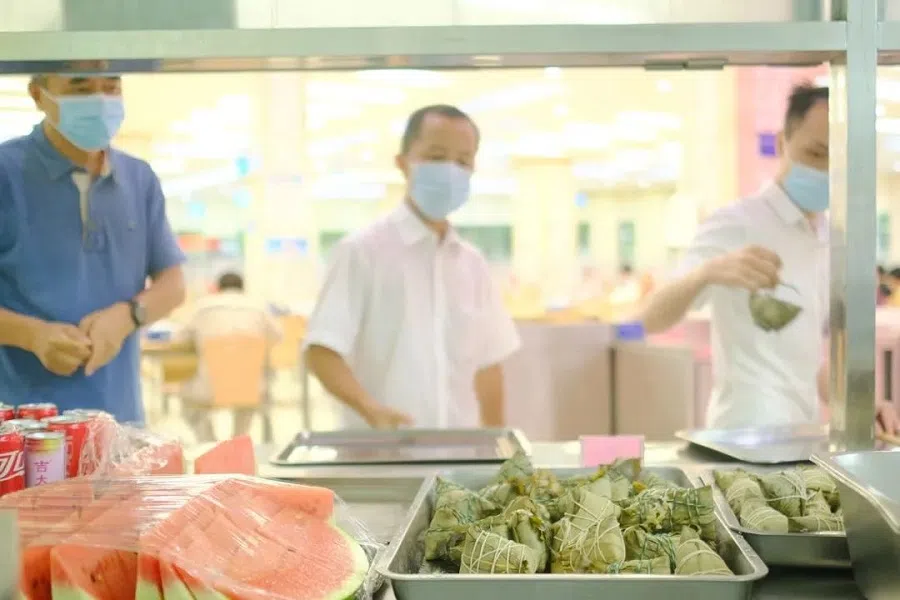
The EDF said in a statement published on the BBC Chinese website on 14 June that there has been an increase in the concentration of "certain noble gases" in the "primary circuit" of the facility's Unit 1, adding that it was a "known phenomenon, studied and provided for in the reactor operating procedures".
The EDF also said that it has called for an extraordinary meeting of the Taishan Nuclear Power Joint Venture Co. Ltd's board of directors "to present all the data and the necessary decisions".
Rare gases are also known as noble gases or inert gases, and refer to seven gaseous elements that do not undergo chemical reactions under a set of given conditions. They are categorised as Group Zero elements in the Periodic Table and include helium (He), neon (Ne), argon (Ar), krypton (Kr), xenon (Xe), radon (Rn), and Oganesson (Og). Among them, krypton and xenon are radioactive.
On the afternoon of 14 June, Paris time, the EDF held a press conference confirming that the rare gases built up in Taishan's Unit 1 were krypton and xenon, and that the build-up was probably due to issues with some fuel rods. However, the measurements of these gases were below maximum levels authorised in China.
The gases were also released within authorised limits. An EDF spokesperson said, "We are not in a scenario of an accident with a melting core. We are not talking about contamination, we are talking about controlled emissions."
This spokesperson added that, after the coating on some of the fuel rods deteriorated, the gas leaked. He said that in such cases, the gases would be collected and treated before being released and that these were normal procedures in the process of removing radioactive elements which are also in "accordance with regulations".

However, this does not explain why Framatome contacted the US Department of Energy over the incident.
In this regard, the BBC's Chinese website quoted David Fishman, manager of Hong Kong energy-focused consulting group The Lantau Group, as saying that this was perhaps because the CGN is on the US's Entity List, but Framatome needed to use the US's technology, data and even research to help CGN solve the problem at the Taishan power plant.
In August 2019, CGN was one of four entities added to the US Department of Commerce's Entity List because it "engaged in or enabled efforts to acquire advanced US nuclear technology and material for diversion to military uses in China". Fishman said this meant that nuclear energy companies could not transfer technology, information or data to it. Nothing from the US nuclear energy sector could be transferred to CGN without a specific exemption. And one of the factors that qualifies for an exemption within the law is maintaining operational safety.
But some netizens also feel that since even EDF has stepped forward to explain matters, it is probably nothing too serious: "If even the French say there's no problem, it's probably true!"
Hong Kong and Macau claim radiation levels normal
However, those in Hong Kong and Macau who live near the Taishan Nuclear Power Plant are not completely at ease. Public information shows that the power plant is about 80 miles (about 129 kilometres) from Hong Kong, and 40 miles (about 64 kilometres) from Macau.
On forum website LIHKG, where Hong Kong and Macau netizens congregate, many people have been debating whether the authorities are hiding anything about the incident. But some netizens also feel that since even EDF has stepped forward to explain matters, it is probably nothing too serious: "If even the French say there's no problem, it's probably true!"
To reassure people, Hong Kong Chief Executive Carrie Lam said before attending an administrative meeting on 15 June that radiation levels in Hong Kong were normal and within limits as of 14 June.
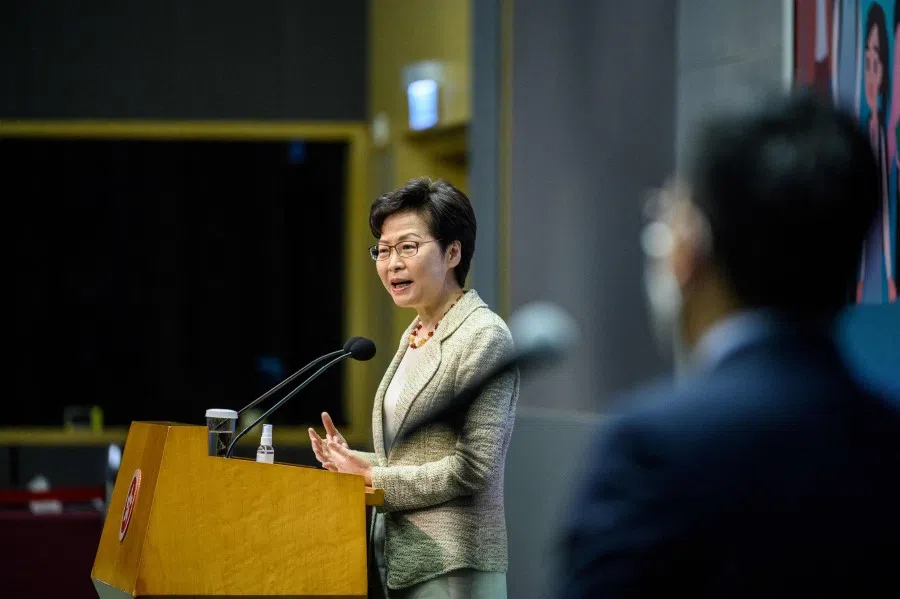
She stressed that the Hong Kong government has a system of various agencies monitoring radiation levels in Hong Kong's environment and water bodies, including the Hong Kong Observatory and Water Supplies Department. At the same time, Macau and Hong Kong both have regular systems to review radiation standards, and the Hong Kong government would be in touch with the relevant agencies in Guangdong that day, and announce any new developments.
Macau's Serviços de Polícia Unitários (SPU, Unitary Police Service) also posted a statement on the morning of 15 June, saying it had been in touch with Guangdong's Nuclear Emergency Committee Office, which said the Taishan Nuclear Power Plant is operating within nuclear power safety regulations, and satisfies technical requirements for power production.
Notably, the statement revealed that so far in 2021, the SPU was notified of two incidents involving the Taishan Nuclear Power Plant, on 21 February and 5 April, both classified as Level 0, with no impact on safe operations, workers' health, or the people and environment nearby.
China's Ministry of Ecology and Environment published on its official website an article from 2011 by radiation prevention expert Zheng Junzheng on the Fukushima incident. It said the uses of nuclear energy are growing, and amid the complicated high-tech facilities and operations, if minor mishaps or lapses occur among the thousands of components, as long as they do not have an adverse impact on nuclear safety, it would be unhelpful to publicise incidents classified as Level 3 or below - Level 0 included - as nuclear incidents.
According to statistics, the first incident at the Taishan Nuclear Power Plant happened in August 2019, with seven similar incidents so far since then, are all classified as Level 0.
Although the Fukushima nuclear power plant is 3,000 kilometres away from Hong Kong and Macau, soon after the incident, many people in Hong Kong and Macau - worried about the effects of radiation blown over from Japan - rushed to buy table salt...
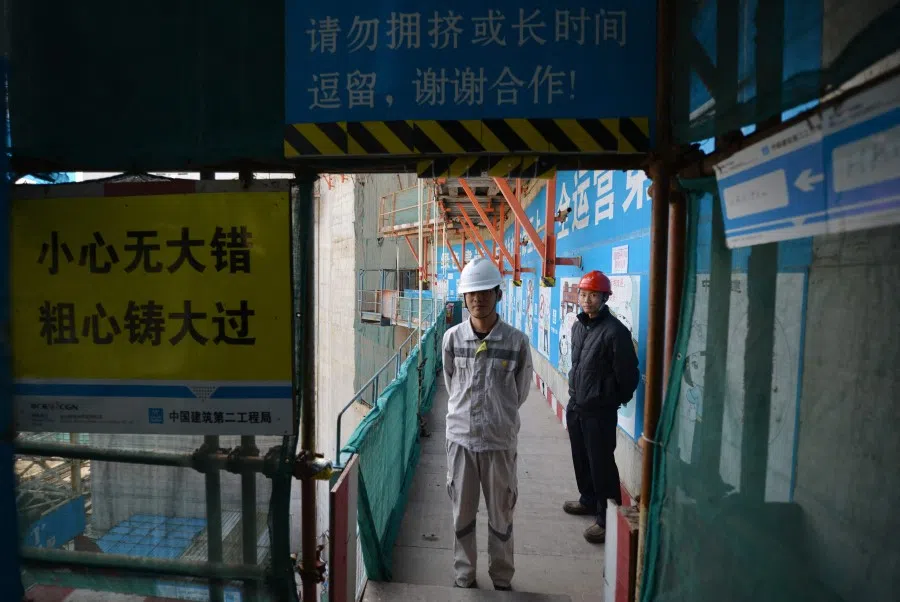
Hong Kong and Macau have always kept an eye on nearby nuclear power plant
In fact, Hong Kong and Macau have always kept an eye on this nearby nuclear power plant, because if there is a serious nuclear incident, it would be difficult for local residents to escape the effects of radiation.
In the 1980s, when the Ministry of Water Resource and Electric Power and the Guangdong local government decided to build the Daya Bay Nuclear Power Plant in Dapeng district in Shenzhen, many Hong Kongers took to the streets in protest, for two reasons: the Chernobyl disaster had just happened, and there were concerns that if a similar accident happened at the Shenzhen nuclear power plant, Hong Kong would become a "dead city".
Another worry was a lack of confidence in China's nuclear technology management at the time. According to Chinese energy sector portal bjx.com.cn (北极星电力网), to allay concerns, the Daya Bay Nuclear Power Plant was subsequently built and managed with nuclear island technology from France, and conventional island technology from the UK, with quality assurance by a US company.
Fast forward to the 21st century, and the 2011 Fukushima nuclear incident has exacerbated the fears of people in Hong Kong and Macau about similar incidents. Although the Fukushima nuclear power plant is 3,000 kilometres away from Hong Kong and Macau, soon after the incident, many people in Hong Kong and Macau - worried about the effects of radiation blown over from Japan - rushed to buy table salt, due to a claim that the iodine in salt could act against radiation. This was later proven to have no scientific basis.
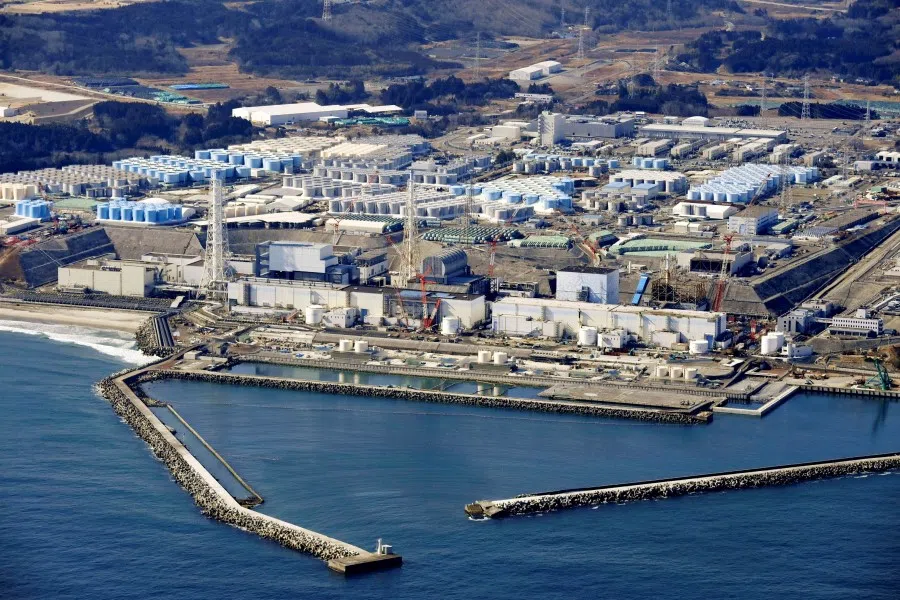
According to the website of the Chinese government, then Chinese Premier Wen Jiabao called an executive meeting of the State Council on the issue, and decided to hold a thorough safety review of China's nuclear facilities to investigate potential safety issues and ensure absolute safety. He also called for a thorough inspection of the nuclear power plants that were under construction, with safety assessments based on the most advanced standards, and an immediate shutdown of sites that did not meet safety standards.
In this context, the Taishan plant - which began construction in November 2009 and became operational in 2018 - would have passed rigorous assessments.
According to Reuters, the Chinese foreign ministry also responded on the afternoon of 15 June that the current situation at the Taishan Nuclear Power Plant is in line with technical regulations, and there are no abnormal radiation levels around the plant, and safety is assured.
Foreign ministry spokesperson Zhao Lijian said at a regular press conference that "China attaches great importance to nuclear safety", and "China's nuclear power plants have kept a good operating record with zero occurrence of incidents affecting the environment and public health." As of December 2020, China has 49 nuclear reactors in operation with 17 more under construction, the highest number in the world.
Indeed, as China's economy grows, so has the number of its nuclear plants, with no serious incidents so far. However, people also need to stay alert to potential nuclear safety risks; after all, if people pay attention, gatekeeping will remain tight. If an incident does occur, the consequences would be unimaginable, and would be an enormous blow to the ruling party and the people.


![[Big read] When the Arctic opens, what happens to Singapore?](https://cassette.sphdigital.com.sg/image/thinkchina/da65edebca34645c711c55e83e9877109b3c53847ebb1305573974651df1d13a)


